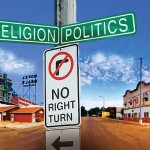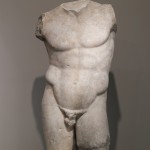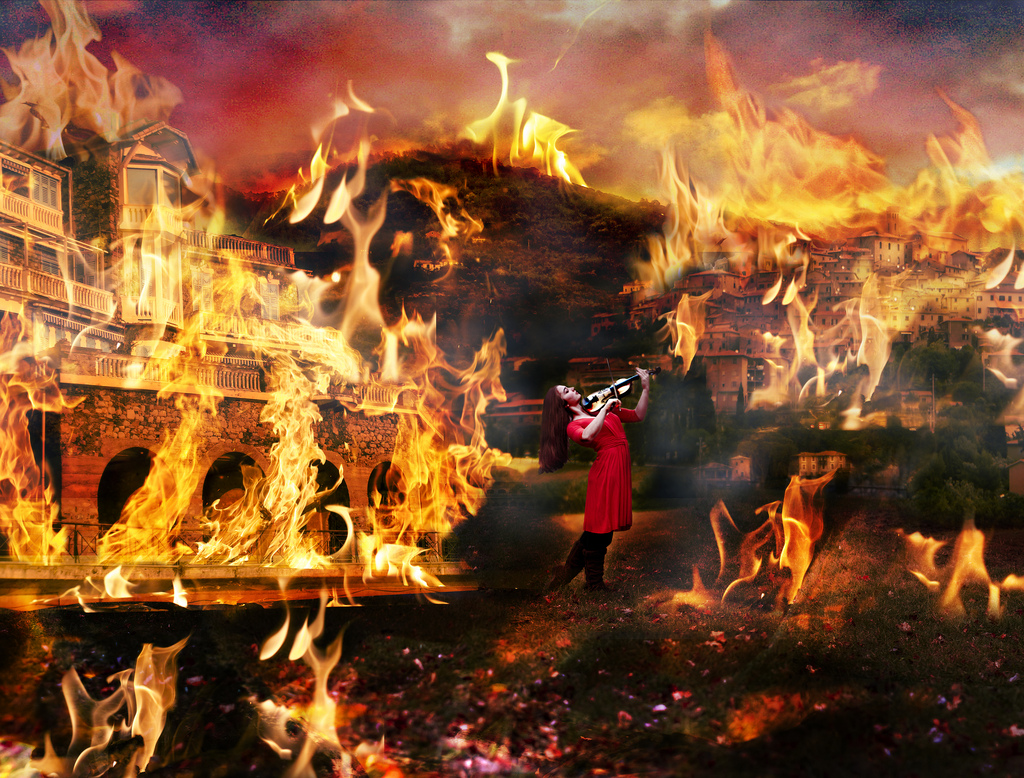I recently had an online discussion with Rua Lupa following her guest post at Humanistic Paganism. Her question was whether a truly humanistic paganism would not be better off without gods — or god-talk. After much back-and-forth and the help of other contributors to the Comments discussion, I came to appreciate that (at least one of) Rua’s concerns with god-talk, even when it is intentionally metaphorical, is that it tempts us to project our own ideas onto the world, rather than connecting directly with What Is. I think she has a valid concern. In the process I came to realize that I use the term “god” not to feel closer to the world, but to remind me of its otherness. And I think Rua and I both have the same goal, although we try to reach it in different ways.
In this post, I want to try to work out a little what I mean when I talk about “gods”. And to start, let me quote from another guest post at Humanist Paganism, this one by M. J. Lee:
“The gods are for me metaphors for nature, or more precisely the names, images and stories are metaphors, allegories and archetypes of our relationship with nature. I see the gods – the names, images, stories – as the poetic encapsulation of our human experience, our relationship with the ineffable forces that shape human life. While this makes the gods no thing, it does not make them nothing. I see the gods as representing very real, powerful, even dangerous forces. I believe the gods are real. It doesn’t matter what we call them or don’t call them. They are real and dangerous, and we will contend with them. This for me is the message of the Bacchae.”
For me, too, “gods” are poetic expressions of my human experience of those ineffable forces that shape my life — both those internal to my personal psyche and those external to me.
It is interesting that M.J. found this to be the lesson of Euripides’ Bacchae. The Bacchae is a play about Dionysus and the triumph of the forces of nature and irrationality over the forces of civilization and rationality, the triumph of those forces beyond our control over those within our control. Gilbert Murray, the Cambridge Ritualist, came to the same conclusion about the Bacchae as M. J. He stated:
“The lesson of the Bacchae is that of the Hippolytus in a stronger form. Reason is great, but it is not everything. There are in the world things not of reason, but both below and above it; causes of emotion, which we cannot express, which we tend to worship, which we feel, perhaps, to be the precious elements in life. These things are Gods or forms of God: not fabulous immortal men, but ‘Things which Are,’ things utterly non-human and non-moral, which bring man bliss or tear his life to shreds without a break in their own serenity.”
This statement by Murray was quoted by Murray’s colleague, Jane Harrison, in her Prolegomena to the Study of Greek Religion, in the context of a discussion of Eros and Bacchus (Dionysus). Harrison writes that “in ancient Greek religion these are the only real gods.” Bacchus, she says, is the god of the “actual religion” (i.e., cultic god), while Eros is the god of “mystical dogma”, the two really being one and the same. Note that Eros, here, is not the cupid-like “god of love”, but the primordial Eros Protogonos, the being who “gave impulse and rhythm to the dance of creation.” And Bacchus is not the drunken “god of wine”; he is Dionysus, the dying-and-reviving god.
According to Harrison, these gods represent a real advance in religion, “not only beyond the old riddance of ghosts and sprites and demons, but also beyond the gracious and beautiful service of those magnified mortals, the Olympians.” In other words, when Harrison talks about these “gods”, she is not talking about supernatural personifications, but something else … something closer to the experience of life itself. According to Harrison, the worship of Bacchus/Eros is “the worship of the real mysteries of life, of potencies (daimones) rather than personal gods (theoi); it is the worship of life itself in its supreme mysteries of ecstasy and love.” After quoting Murray, she goes on: “It is these real gods, this life itself, that the Greeks, like most men were inwardly afraid to recognize and face.”
Harrison also quotes Robert Browning:
I saw that there are, first and above all,
The hidden forces, blind necessities,
Named Nature, but the thing’s self unconceived :
Then follow, — how dependent upon these,
We know not, how imposed above ourselves,
We well know, — what I name the gods, a power
Various or one; …”
Browning’s poem goes on:
… for great and strong and good
Is there, and little, weak and bad there too,
Wisdom and folly : say, these make no God, —
What is it else that rules outside man’s self?
— Robert Browning, The Ring and the Book
That is the question: What is it that rules outside man’s self? Murray’s answer is his “Things which Are”. Harrison calls them potencies and daimones. Browning names them the “hidden forces” and “blind necessities”.
Jung offer a similar conception of the gods, as the uncontrollable natural forces of our psyche:
“There are factors to be considered which are not under our control. Experience of the [archetypal] opposites has nothing whatever to do with intellectual insight or with empathy. It is more what we would call fate. Such an experience can convince one person of the truth of Christ, another of the truth of Buddha, to the exclusion of all other evidence.”
Jung likens these factors not under our control to fate in their influence on out lives. In Psyche and Symbol, Jung calls these uncontrollable natural forces of the unconscious to “acts of God”:
“[T]he will can control them only in part. It may be able to suppress them, but it cannot alter their nature, and what is suppressed comes up again in another place in altered form, but this time loaded with a resentment that makes the otherwise harmless natural impulse our enemy.”
Although Jung likens these forces to acts of “God” — with a capital “G” — he goes on to explain that a more apt comparison is to the Greek daimones, a term used by Harrison above:
“I should also like the term ‘God’ in the phrase ‘the will of God’ to be understood not so much in the Christian sense as in the sense intended by Diotima, when she said: ‘Eros, dear Socrates, is a mighty daemon.’ The Greek words daimon and daimonion express a determining power which comes upon man from outside, like providence or fate, though the ethical decision is left to man.”
In response to Rua’s post, M. J. wrote:
“The gods and myths are very powerful and useful symbols and metaphors. It may turn out that the supernaturalist baggage is too much and that we are better off inventing a new language to describe what we mean (as in the Brendan Myers’ Immensities), but regardless of what we call them, I think we need something like gods to encapsulate our values, emotions, and experiences of this ‘mysterium tremendum’ that is Nature.”
“Immensities” is a term used by Brendan Myer to refer to certain human experiences which are often surprising and unexpected and beyond our ability to understand or control. He includes among his immensities natural phenomena, other people, and death.
Things which Are. Potencies. Daimones. Hidden forces. And blind necessities. Nature. Fate. Immensities. Mysterium Tremendum … Gods. Whatever they are called, these experiences reminds us there is something fundamentally beyond our control that exerts influence on our lives. They call us to humility and to an acknowledgment of otherness — to the recognition that the world is not an extension of my ego. These terms evoke mystery and ineffability for the purpose of maintaining that sense of separation between us and the world.
For all the talk about connection and oneness in Neopagan and New Age talk, it is equally important to remember the difference, the separation, the otherness of the world. We can encounter this otherness in nature, in other people, and even in our own psyche. And it is here that I think I can find common ground with Rua, who fears that god-talk leads to anthropomorphizing which leads to anthropocentricism. I agree that we need to maintain the experience of otherness in our encounter with the world … or it is no encounter at all. And the gods help me do that.
When I speak of gods, I am not talking about using metaphors of my human relationships to explain my relationship to the world. Rather, speaking of the earth or the thunderstorm as a god reminds me that these things are not human. They are as wonderful and capricious and dangerous as the Greek gods seemed to the Greeks. One of the lessons of Greek mythology was that human beings are not gods. This is something which we often forget since Renaissance humanism brought the Greek gods down to earth so to speak. And those heroes in the myth who forgot the separation of man from god were inevitably punished by Nemesis (fate).















